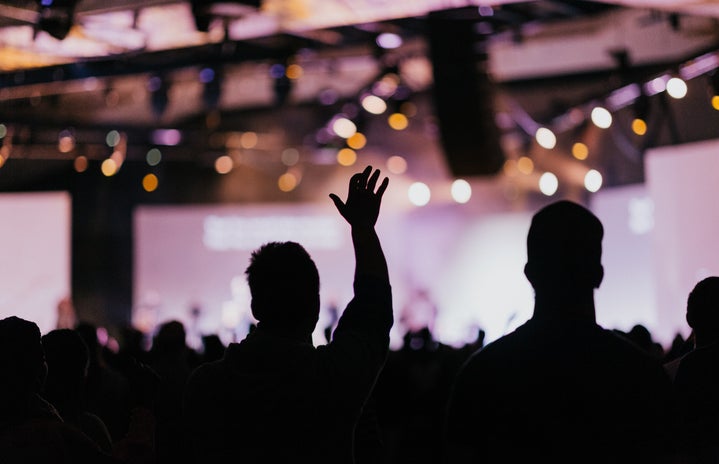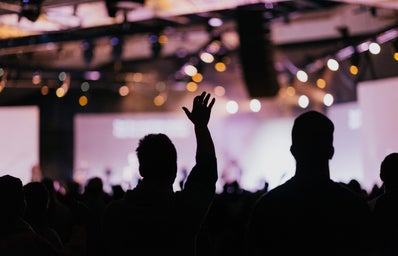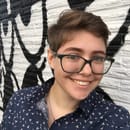An NYC-based producer, guitarist, and songwriter, as well as a first-year student at The New School, Ryan Natsis produces everything they do in their own dorm room. Currently working on a solo music project entitled Glass Reef and focusing on creating surreal dreamscapes within songs, they utilize only a keyboard, a guitar, and a computer in their creations (including a single entitled ‘Persephone,’ coming out on March 30th). Last week, Ryan sat down with Her Campus between classes to discuss the inside scoop on their music, their production methods, and what it means for them to be a non-binary person holding a position of visibility in the music world.
HC: Can you start out by telling me a little bit about your music—like what genre, what inspires it?
RN: I mainly write indie rock…and I’m really influenced by the bedroom-pop genre, because it’s like a community of people who are making music in their bedroom, with really DIY [do-it-yourself] kinds of sounds and stuff like that. So yeah, that’s what I align with.
It’s so stupid to say life inspires my music, but mental illness is a huge part of what I write about. And also just LGBT stuff…I like to write about politics, actually; I really enjoy writing political songs, although I don’t [write them] super often.
HC: And so bedroom pop—you may have to educate me a little on this; I knew you wrote and recorded songs in your bedroom, but I didn’t realize it was a genre. Can you tell us a bit about that?
RN: Yeah; the main person who’s coming to mind, her name is Clairo. She recorded a song called ‘Pretty Girl’ in her bedroom, and it got super popular like overnight. It’s a democratizing of music where, because it’s more accessible—to a degree; obviously there’s certain [computer] programs and stuff—but it’s just a genre of young people, kind of inspired by Mac Demarco, who make indie pop, but it’s categorized by a DIY kind of mindset that sets it apart. So it’s mainly—I think the DIY part is what makes it what it is.
HC: So, the DIY part—what’s something you have to do to do this that you wouldn’t have to do in a normal recording studio?
RN: That’s such a good question. I don’t own a bass guitar; I have a guitar that I have with me at college, so all the bass lines that I write are just my guitar—like I’m only playing on one string that’s tuned really down low. So instead of actually getting a bass guitar, I play all the bass parts on my guitar, and then just use bass amp effects and stuff on the computer to make it sound like it is what it is. I also don’t play piano, but I use a keyboard in some of my songs—but, like, I don’t play piano…but I do. I don’t know how to play piano, but I do it anyway.
I learned about Music Theory, which helped a lot—so I know how to get around a piano, but I can’t actually play anything, so I use [music theory] a lot. Like how you [might] sort of know some languages, you can work your way around them—that’s how I am with instruments.
HC: And it’s so interesting, because I don’t know if bedroom pop is confined to kind of a toned-down sound, but if it is I find that really cool that it’s something that’s super toned down and stripped, and at the same something that’s really made possible because of technology and social media.
RN: Yeah. I know there are some bedroom pop artists whose sound is, like, super psychedelic, and dense, and stuff, and then artists like, Clairo [do] a very minimalistic kind of pop, so there’s a really wide scope on what’s possible, which is nice; there really aren’t any rules.
HC: Just to continue in the bedroom pop vein, what’s something really challenging about that, and what’s something you get out of it that’s beneficial that you wouldn’t get otherwise?
RN: Something that’s really challenging is trying to keep my self-esteem up because I’m intimidated by other artists a lot. So when I’m around fellow musicians who are like “Oh, my manager said this,” and “My producer is making this,” they have all these people, and a studio, and a manager, and shows, and stuff like that. I have to make things happen by myself, because I don’t have a producer, and I don’t have a recording studio, there are all these resources that I don’t have. But at the same point, when my stuff does get recognized, I therefore get the opportunity to say that it’s all mine. Which is super nice—just having full credit. Although I am working on being more open with my art, because I feel like I want to collaborate, and I want to have a team of people to help me, but at this point in time, it’s really nice to say that it’s 100 percent me. And also just the resume tech skills that come along with it. The skills that I got trying to do sh*t by myself is—it’s pretty good [laughs]. I’m proud of that.
HC: You definitely should be—that’s really cool. Now—you know, being a nonbinary artist, you’re poised to be in a position of visibility that not a lot of non-cis [gender] musicians have been in. Can you speak to how that makes you feel?
RN: Kind of…lost. I remember when I first started wanting to do music, I started looking up LGBT musicians—and that number’s already super slim, and [the number of] trans musicians is even slimmer, and then nonbinary is even, even slimmer. And not only are there not a lot of artists who are nonbinary, there’s also not a lot of artists who are in my genre, as well. Uh, the one person who really sticks out to me who’s great is [Laura Jane] Grace of Against Me—she’s like a punk rock singer [and an] amazing trans artist. And yeah—so I’m kind of doing it on my own, and I’ve been lucky enough not to, like, have any issues with it—everyone’s been really cool about using pronouns and everything, and everything’s going really well so far, but I’m also just starting so I don’t want to get too ahead of myself [laughs]. I like to be optimistic, but not too optimistic; I’m not getting out of hand with it.
If anything, it’s benefiting me right now, because by advertising the fact that I’m LGBT—not necessarily advertising…it’s just a way of me getting in contact with who I want my music to be for. Like, by establishing myself as [LGBT] and being open about that, I feel like I’m purposefully trying to make music by and for LGBT people. So by advertising it, I want to be like a beacon. I’m like, “Come, children!” [laughs]
HC: Like it kind of gives you a purpose within your music.
RN: Yeah, exactly. And I want that to be a part of my career, because that’s the audience that I’m trying to target, you know? That’s my people. Those are my people.
HC: Just out of curiosity, you mention [Laura Jane] Grace from Against Me; are there any other non-cis artists that you admire or are the pickings really slim?
RN: They’re really slim. Many artists are progressive, but not necessarily anybody who’s quite like me. There are so many fantastic artists, but I really haven’t found anyone who’s nonbinary yet. But I’m trying to! [I]f they’re out there, I am trying to link up [laughs] but it’s hard. There are so many amazing LGBT artists, so I feel like I look up to people who are not necessarily musicians in my genre, but like other peers and writers, and other queer people.
HC: Now—you have a single coming out at the end of the month called ‘Persephone,’ if I’m not mistaken. Can you tell us about that?
RN: Yes! I wrote that because I used to really love the wintertime, and now I’ve experienced a complete 180. And I already have depression, so when it’s super cold outside, I then get into Seasonal Affective Disorder territory, which is, like, when the weather is so bad [that]…you’re depressed. That’s just how it be. So in the myth of Persephone, I’m kind of using her as the personification of springtime, because she has to spend half the year in the underworld where it’s cold, and winter, and sh*t like that. So when she comes back with her mom, she brings springtime. I’m kind of using Persephone to personify springtime and, like, kind of pining after that.
I wish that it was sunny out so I could feel okay, and [I’m] using Persephone as a frame, kind of, to that narrative.
HC: Do you have any other music out? And if so, where can it be found?
RN: I have other songs in progress. I do have another single lined up to come after [‘Persephone’]; it’s a little too early to be talking about it yet, but I definitely am going to be releasing stuff closely on the heels of ‘Persephone.’ So there definitely will be more, but this is the first official thing. It’s hard, ‘cause I don’t like to release things before they’re absolutely, positively finished, and then that takes me a long time—so yeah, I have to keep myself on a timeline.
HC: And where will people be able to find those songs? [On] Spotify, or Instagram…?
RN: Yes! Spotify, Apple Music, iTunes, Deezer—I think, like, all the mainstream services. Soundcloud, Bandcamp, I’ll have everything out [laughs].
Want to connect with Ryan? You can follow them (and their musical project Glass Reef) on Instagram, BandCamp, and Twitter. Make sure to keep an eye out for ‘Persephone,’ out on March 30th.
[Interview has been edited and condensed for clarity.]
[All images provided by Ryan Natsis]



